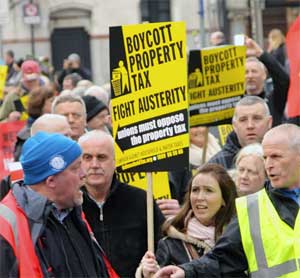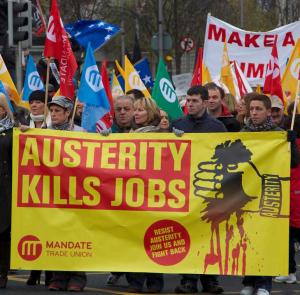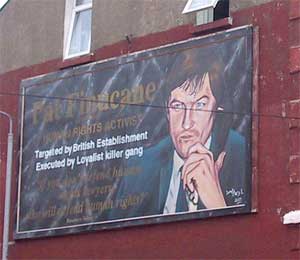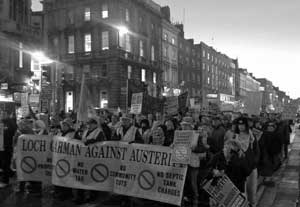Over 30 years of anarchist writing from Ireland listed under hundreds of topics
Opinion
The Croke Park extension: What it is and how to fight it.
 Early yesterday morning, the leadership of the public sector committee of ICTU emerged from talks with the government claiming they had achieved the best possible outcome from the negotiations. The best possible outcome in question involves extra hours at work, cuts in overtime rates and allowances for unsociable hours, delayed increments and revisions to flexitime arrangements and work-sharing patterns.
Early yesterday morning, the leadership of the public sector committee of ICTU emerged from talks with the government claiming they had achieved the best possible outcome from the negotiations. The best possible outcome in question involves extra hours at work, cuts in overtime rates and allowances for unsociable hours, delayed increments and revisions to flexitime arrangements and work-sharing patterns.
"We are living under extraordinary circumstances and people are suffering extraordinary miseries.” – Jack O’Connor on Today FM’s The Last Word. There’s more misery to come.
You can't eat a flag - or a border poll
Over recent weeks we have seen leaders of Nationalism call for border polls while seeing leaders of Unionism once again using a flag to whip up the loyalist working classes. This further creates division and raises sectarian tensions between Catholic and Protestant neighbours. It also diverts attention away from the issues of socio and economic deprivation, poverty, lack of social and affordable housing and the bread and butter issues of life. Yet these are the issues that day and daily affect working class communities lives the most. Politician’s words promised delivery on such essential issues of concern. And words are all that many have heard, as little change can be seen within many working class communities The old adage of ‘you can’t eat a flag’ couldn’t be more apt at this time of recession, cuts, job losses and misery for many.
Spotlight poll confirms failure of republican project
The latest Spotlight poll indicating the vast majority of Northern Ireland voters would reject Irish unity highlights the need to build a different type of politics which is not rooted in tribal loyalties, but based on class and revolutionary transformation of society. While some republicans may say the poll is not representative and that real opinions can only be revealed by an independent referendum north and South of the border, the reality is polls over the years have consistently indicated minority support for a United Ireland. (1)
ICTU: Taking the politics out of protest
 Depending on whose figures you believe, somewhere between 50,000 and 100,000 people took to the streets yesterday (Sat 9th February) to register their opposition to the foisting of private bank debt onto the shoulders of ordinary workers, the refusal to tax the wealthy and the accompanying austerity agenda which has led to wage cuts, job losses, cuts in services and a plethora of increased taxation measures all of which have disproportionately affected those on low and middle incomes.
Depending on whose figures you believe, somewhere between 50,000 and 100,000 people took to the streets yesterday (Sat 9th February) to register their opposition to the foisting of private bank debt onto the shoulders of ordinary workers, the refusal to tax the wealthy and the accompanying austerity agenda which has led to wage cuts, job losses, cuts in services and a plethora of increased taxation measures all of which have disproportionately affected those on low and middle incomes.
The Northern Ireland flag protests and Direct Action
If there is anything we can take from the continuing street protests in loyalist heartlands is that we are from powerless if we utilise direct action rather than constantly lobbying our politicians and peacefully marching from A-B.
Croke Park talks are a farce - unions have no mandate to enter negotiations
 According to RTE (Monday 14th Jan), “The opening negotiations on a new public service agreement have ended after a meeting between management and unions.” It’s tempting to ask whether anyone on either side of the talks has even a basic idea of what the word “negotiations” means. Even in a hostage situation, if the police open “negotiations” with the hostage takers, it’s usually with a tacit understanding that there will have to be some concessions made in order to secure the release of the hostages. In this case however, it’s akin to the police negotiator discussing with the hostage taker whether the hostages are to be killed by gunshot, stabbing or poisoning. The notion that the role of the negotiator is to secure the release of the hostages has been ditched.
According to RTE (Monday 14th Jan), “The opening negotiations on a new public service agreement have ended after a meeting between management and unions.” It’s tempting to ask whether anyone on either side of the talks has even a basic idea of what the word “negotiations” means. Even in a hostage situation, if the police open “negotiations” with the hostage takers, it’s usually with a tacit understanding that there will have to be some concessions made in order to secure the release of the hostages. In this case however, it’s akin to the police negotiator discussing with the hostage taker whether the hostages are to be killed by gunshot, stabbing or poisoning. The notion that the role of the negotiator is to secure the release of the hostages has been ditched.
Ulster Loyalism, Flag Protests & the failure of zero sum politics
The continuing opposition by loyalists to the decision by Belfast city council to limit the flying of the Union Jack is a product of a deeply sectarian colonial settlement that smothers the importance of class. The disturbances were pretty predicable in the context of summer riots over parading, intra unionist rivalry and rising anger in traditional protestant working class communities over shortage of jobs, housing and perceived gains made by the ‘nationalist’ community. The mass inflammatory leafleting by unionist parties in the days leading up to the council vote served to heighten fears in a constituency which is easily inflamed and mobilised in defence of the realm. This is not the cause of the disturbances; but the logical conclusion of capitalist decay and opportunist politicians battling for the hearts and minds of protestant working class communities- disenchanted and disillusioned with the peace dividends promised over 10 years ago.
Working Class Unity not Sectarian Diversions
Once again violence has flared across Belfast and other parts of the north as protests continue around the flags issue. The latest disturbances come as Stormont Assembly leaders, Peter Robinson and Martin McGuinness meet to discuss another wave of street protests, and their concerns about the damaging effect it is having on the economy leading up to the busiest shopping period of the calendar. But as each issued a separate statement calling for protests to come to an end, loyalist gangs flexed their muscles, blocking off streets and hijacking cars.
Pat Finucane murder & the cover up of Britain's dirty war in Ireland
 Pat Finucane was murdered in front of his wife and children in Belfast in February 1989. Because a British MP and junior minister Douglas Hogg had suggested in Westminister days earlier that particular solicitors were "unduly sympathetic to the IRA" and because of a longstanding belief by many that there was active collusion between the State and loyalist paramilitaries, questions immediately started to be asked. The report on Wednesday of the De Silva commission into the murder was the latest attempt by the highest levels of the British state to absolve themselves of any responsibility or guilt into what is often refered to as the 'Dirty War' waged in Ireland during the whole period of the troubles. A similar effort was made with the report of the Bloody Sunday tribunal, both reports sought to ring fence responsibility to rogue elements or as minor players as possible within the state apparatus. The reason for this is an attempt to protect the integrity of the state and it's security services.
Pat Finucane was murdered in front of his wife and children in Belfast in February 1989. Because a British MP and junior minister Douglas Hogg had suggested in Westminister days earlier that particular solicitors were "unduly sympathetic to the IRA" and because of a longstanding belief by many that there was active collusion between the State and loyalist paramilitaries, questions immediately started to be asked. The report on Wednesday of the De Silva commission into the murder was the latest attempt by the highest levels of the British state to absolve themselves of any responsibility or guilt into what is often refered to as the 'Dirty War' waged in Ireland during the whole period of the troubles. A similar effort was made with the report of the Bloody Sunday tribunal, both reports sought to ring fence responsibility to rogue elements or as minor players as possible within the state apparatus. The reason for this is an attempt to protect the integrity of the state and it's security services.
Budget 2013 & the dark times to come
 Roughly 1,000 people protested at the Dail last night as yet another austerity budget was debated. As with previous budgets the new flat rate taxes, PRSI & excise hikes will mean workers & those on low income will be hit hard while the richest 1% will hardly notice any difference.
Roughly 1,000 people protested at the Dail last night as yet another austerity budget was debated. As with previous budgets the new flat rate taxes, PRSI & excise hikes will mean workers & those on low income will be hit hard while the richest 1% will hardly notice any difference.

